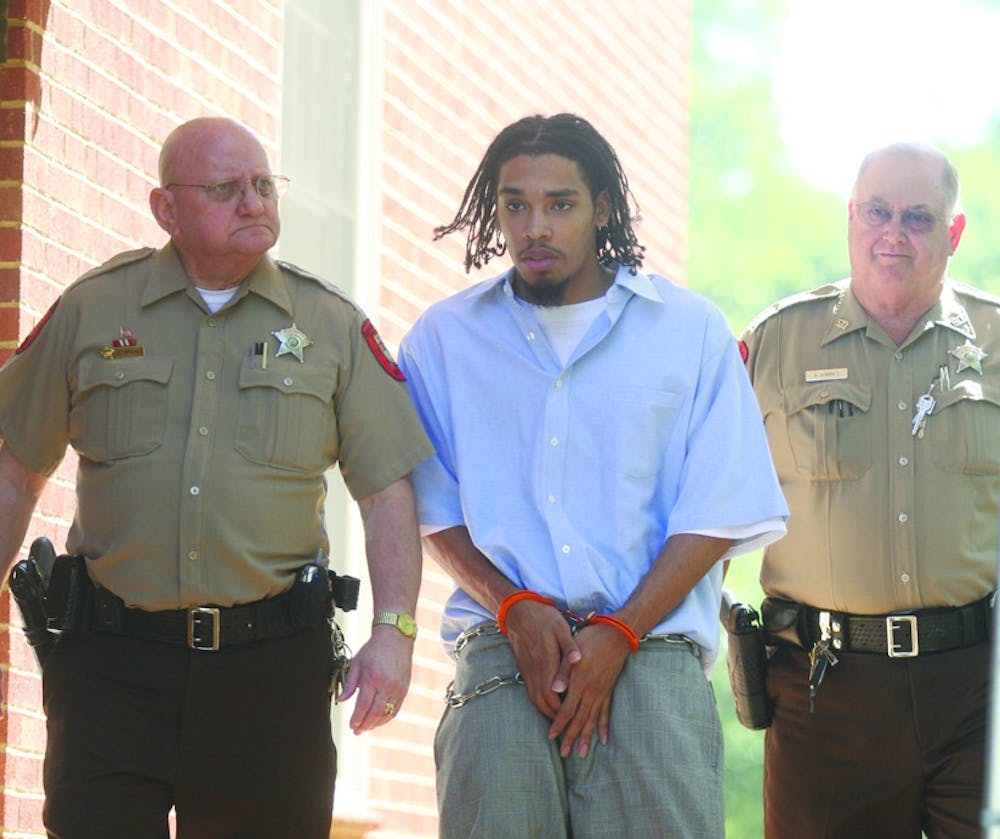The public may never know Demario Atwater’s full defense against charges that he killed former Student Body President Eve Carson.
Atwater, 23, pleaded guilty Monday to federal charges related to Carson’s death in exchange for life in prison without parole. He would have been eligible for the death penalty if convicted in the trial, which was set to begin May 3.
Atwater still faces first-degree murder and kidnapping charges in state court, along with codefendant Lawrence Alvin Lovette, 19.
But Atwater’s federal court plea, because it sets him up to receive the second highest punishment possible for his crimes, reduces the incentive for Orange County’s district attorney to go through a trial in state court.
The only harsher sentencing a trial in state court could bring would be the death penalty — and death penalty trials are much longer, more expensive ordeals with more obstacles for the prosecutor.
A hearing is tentatively set for next week in state court, during which the district attorney could decide he is also satisfied with accepting a guilty plea for charges related to Carson’s death. That would end the trial process.
“If we have already locked him up for the rest of his life, does it make sense to spend time and money and put the family through an emotional roller coaster?” said Duke University law lecturer Tom Maher, who is executive director of N.C. Indigent Defense Services. “Does it make sense to try death, when in North Carolina it is so hard to get to that point?
“There is no incentive.”
The federal effect
Hundreds of crimes occur in North Carolina that are schematically identical to the one that ended in Carson’s death.
Prosecutors say on March 5, 2008, Atwater and Lovette kidnapped Carson from her home, took her to ATM machines to withdraw $1,400 from her bank account, and then shot her in a neighborhood off East Franklin Street.
The state charged them both with first-degree murder and first-degree kidnapping.
Usually, federal prosecutors wouldn’t get involved.
Legal experts following the case have different theories about why Atwater’s case was different.
Some say federal courts got involved to ensure that he received the death penalty, evidenced by the fact that they pursued charges against Atwater, who is old enough to receive the death penalty, but not against Lovette, who was too young at the time of the crime.
Local criminal defense lawyer Barry Winston said he thinks the involvement came with a desire to latch on to a high-profile case.
Whatever the incentive, federal courts are known for going through the legal decision process efficiently, which can either provide quicker closure or a lack of full answers to questions about the crime.
“It’s terrible that the feds got involved, that they pushed this case as rapidly as they did,” Winston said. “We will never know whether Demario Atwater ever had a defense or not.”
Burdens of a capital trial
Legally, the decision made in federal court has no bearing on Atwater’s state charges.
“It really doesn’t affect us because they’re two separate things, two separate cases,” Orange County District Attorney Jim Woodall said.
But logistically, pursuing the death penalty for Atwater would mean a lot more hoops for the prosecution to jump through, from screening jurors for strong opinions to an appeals and post-conviction process, Maher said.
UNC law professor Rich Myers said it might be difficult to get an Orange County jury to agree to a death penalty sentence.
Carson’s parents stated they were in agreement with the plea bargain in federal court.
So with one governmental body in agreement with the result, as well as the family of the victim, it is up to the district attorney whether he wants to negotiate a plea bargain or go through with the trial process in pursuit of capital punishment.
“The first and most important decision is Woodall’s to make,” Winston said. “Given what I know about him and what I’ve read about the wishes of Eve Carson’s family, it would not surprise me if Woodall said he was satisfied with the results obtained in federal court.”
What this means for Lovette
Because Lovette is ineligible for the death penalty, his trial will be much simpler: a question of whether he committed the crime, and if so, whether it was in the first degree.
“If it were a capital case, that would be the beginning and not the end,” Maher said. “These trials often take a week and sometimes less.”
But they will no longer have the advantage of seeing Atwater’s federal trial play out first.
“They might have been hoping to get a sneak preview of all the government’s evidence,” Myers said.
Contact the City Editor at citydesk@unc.edu.
Death penalty dropped for Atwater in Eve Carson case

Demario Atwater is escorted to a 2008 Orange County court appearance. DTH File Photo


